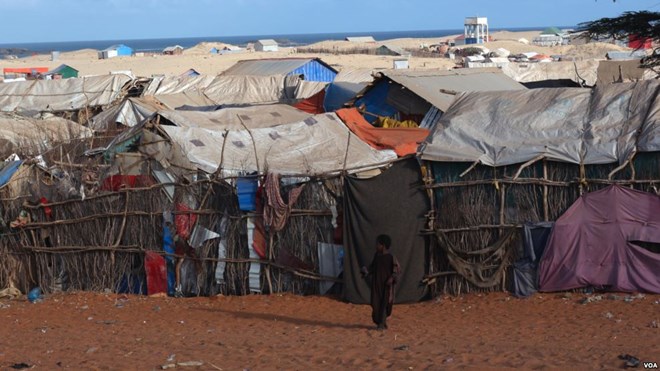
Mohamed Yousuf
Wednesday November 23, 2016

Camp Kismayo: Most returnees ended up living in camps. Unlike Dadaab camp in Kenya, camps here lack basic services, Kismayo, Somalia, Nov. 18, 2016. (M. Yusuf/VOA)
KISMAYO, SOMALIA — Some 18,000 former refugees have poured into the Somali city of Kismayo this year, with most struggling to find adequate shelter, food, health care and jobs.
Abdullahi Mohamed, a former refugee in his 20s, is hoping he can buck the trend. Unlike most other youths, he's received training with a local mechanic at a Kismayo garage.
"At least here I have got something to learn and do," he says. "Back in Dadaab camp [in Kenya], I was not able to get an opportunity like this one I have here today." His training, originally scheduled to end in a month, has been extended through February.
A U.S.-based non-governmental organization, the American Refugee Council, is sponsoring job training for returnees like Mohamed so they can get the skills they need to support themselves and help Somali society.
Just as important, the ARC and local authorities want to keep youngsters away from Islamist militant groups that continue to operate in the still unstable country.
“Some of the youths who are returning are high school graduates, with the science knowledge they have, al-Shabab may take advantage of them and use them and teach them how to make explosives," says Abdi Ibrahim Abdi Barre, the deputy mayor of Kismayo. "Young people are vulnerable. If they are not provided with the skills, education and materials they need to pursue their goals, then people will take advantage of them."
According to the United Nations refugee agency, at least 34,000 Somalis have returned home since the repatriation process began. Most came back to nothing, complaining of a lack of essential services.
ARC works with business owners in Kismayo to provide returnees with job skills needed in the market.
Shafii Ali, 20, is one of the beneficiaries. He is learning how to make window frames.
“In the training center, I learn how to make window frames and install the glasses. In the beginning, I was thinking its not possible to learn the skill. I am happy now, and I know how to make one,." he says.
Three months into the training, Ali is looking into the future.“When I complete my training at this center I would like to have my own workshop. And also to help by teaching the skills to the young people who are returning to the country from Dadaab,” he says.
Mohamed says its time for him and other youths to forget the lives in the camp and build a better life in their country.
“Those youths who are coming back, it's time for them to work and depend on themselves. It’s time for them and me to leave the life of refugee where they depended on others to help them. It's time to start working and building something for ourselves."
Abdi Barre noted the society should be involved in shaping the future of its youth.
“Our opportunities are limited but want, we all do agree is that these youths need to show the right direction. They cannot be left alone. We can provide education and create jobs. For this to succeed everyone should be involved. We should not leave this to the aid agencies alone.”